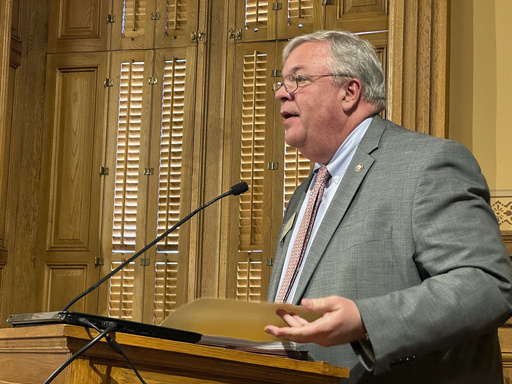
ATLANTA — The Georgia state House has taken steps to increase funding for Hurricane Helene relief by reallocating resources from some of Governor Brian Kemp’s proposals for prison and construction expenditures.
On Thursday, the House overwhelmingly supported House Bill 67 with a vote of 166-3, which amends the existing state budget valid until June 30. The bill allocates an additional $75 million for low-interest loans aimed at assisting farmers, as well as for the cleanup of fallen timber on private properties. Next, the proposal will head to the Senate for further evaluation.
In addition to these funds, the budget outlines $1 billion for the third wave of income tax rebates that Governor Kemp and legislative leaders have promised to constituents. The plan proposes refunds of up to $250 for individual filers, as well as up to $375 for single parents and $500 for married couples filing jointly. Early budget allocations had already set aside $75 million for agricultural loans and $25 million for timber cleanup, but House Appropriations Committee Chairman Matt Hatchett noted that these amounts did not satisfy the growing demand.
“The House felt compelled to make additional resources available,” stated Hatchett, a Republican from Dublin. Furthermore, included in the budget are $10 million for grants directed at rural communities, $35 million for local hospitals, and $1.4 million aimed at enhancing pay for employees in the Department of Human Resources responsible for determining benefit eligibility. All these expenditures have been characterized as part of the continued relief efforts following Hurricane Helene.
Should Governor Kemp and the Senate reach an agreement, the state of Georgia stands to invest over $800 million in aid for local governments and individuals impacted by the hurricane’s path through eastern Georgia. Furthermore, lawmakers are examining potential tax relief measures for farmers and timber producers, which may push relief spending to exceed $1 billion.
Kemp has presented a plan to augment overall spending by $4.4 billion in state funds for the remainder of the budget year, with $1.7 billion derived from forecasted revenue growth. The remaining $2.7 billion will be sourced from Georgia’s surplus and reserve funds, which total around $16 billion. Overall, Georgia’s budget would see an increase to $40.6 billion in state funding, up from the previous $36.1 billion approved last spring. In addition, billions more will be allocated from federal aid and other financial resources.
Since lawmakers are constrained to not exceed the amount proposed by Kemp, they have had to make cuts in other sectors to enhance funding for their priorities. While Kemp proposed plans for building four new modular prisons, the House opted to limit funding to two, thereby saving $47 million in the process. Moreover, they trimmed back planning funds for an additional new prison by $10 million.
Also on the cutting block were $100 million that were earmarked for debt repayment and over $40 million allocated for state building repairs. Additionally, lawmakers eliminated $15 million intended for replacing Georgia’s ballot scanners and printers that currently rely on machine-readable barcodes.
Despite these reductions, the House aligns with Kemp’s view that further investments in prisons are necessary, with Hatchett referring to a proposed $333 million increase in funding as “the centerpiece of the budget.” “I know this is still just the beginning of a costly yet crucial endeavor,” Hatchett commented regarding the prison upgrade initiatives, which suggest that years of enhanced funding will be required to both renovate and secure the facilities.
The House is also striving to expedite the hiring of correctional officers to counteract the current staffing shortages, proposing an additional $3 million for this purpose compared to Kemp’s budget. Hatchett stated that, with these extra funds, the House believes 400 new guards could be hired by the end of June, up from the original goal of 330. The House’s budget further enhances pay for private prison guards and allocates funds for body-worn cameras, electric stun guns, and an electronic monitoring system.
Moreover, the House has signaled approval of Kemp’s initiatives to bolster infrastructure funding, which includes $502 million dedicated to sourcing water from the Savannah River to serve Savannah and adjacent counties, notably supporting the new Hyundai Motor Group plant situated in Ellabell.

